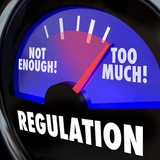#Trump Председатель Федеральной комиссии по связи США (#FCC) Аджит Пай может объявить свой план отмены сетевой нейтральности уже в апреле https://www.vedomosti.ru/technology/articles/2017/04/18/686131-printsip-setevoi-neitralnosti
www.vedomosti.ru
Федеральной комиссии по связи США будет сложно отменить принцип сетевой нейтральности
Он ставит разные типы трафика в равные условия
#Trump #OIRA Dramatic change to regulatory procedure! https://www.forbes.com/sites/susandudley/2017/04/26/a-new-direction-for-regulation-in-president-trumps-first-100-days/#33f41c045f26
Forbes
A New Direction For Regulation In President Trump's First 100 Days
In his first 100 days, President Trump has overturned more than a dozen regulations, rescinded numerous executive actions and established a system of regulatory oversight that, for the first time, incentivizes agencies to evaluate the accumulated stock of…
#Trump #OIRA Memorandum For: Regulatory Reform Officers and Regulatory Policy Officers at Executive Departments and Agencies https://www.whitehouse.gov/the-press-office/2017/05/08/memorandum-regulatory-reform-officers-and-regulatory-policy-officers
whitehouse.gov
Memorandum For: Regulatory Reform Officers and Regulatory Policy Officers at Executive Departments and Agencies
May 8, 2017 M-17-24
#trump #deregulation https://www.nytimes.com/2017/07/11/business/the-deep-industry-ties-of-trumps-deregulation-teams.html
Nytimes
The Deep Industry Ties of Trump’s Deregulation Teams
A campaign to cut government rules is being conducted largely out of public view, often by hires with potential conflicts, an investigation has found.
#trump #OIRA #redtape #OneInTwoOut "The first substantive question Ms. Rao faced during a Senate confirmation hearing last month struck at a hot topic on Capitol Hill: How did she view an order by Mr. Trump to eliminate two regulations for every new one, and how should it be carried out? As she answered, Ms. Rao measured her words, calling the policy “an important step” in broadly reducing regulatory burden. “It can work,” she said. “The way I think it will work in practice is that agencies will identify regulations to eliminate. And those regulations might be ineffective ones or excessively burdensome. And those regulations will have to meet a cost-benefit analysis for deregulation before they’re going to impose any new regulatory burdens.” As her testimony continued, she went so far as to give Democrats a nod that her cost-benefit analysis would go beyond simply calculating financial costs to industry — agreeing that non-monetary benefits, to health and the environment, for example, “can play a role.” https://www.nytimes.com/2017/07/09/business/the-scholar-who-will-help-lead-trumps-assault-on-rules.html
Nytimes
Neomi Rao, the Scholar Who Will Help Lead Trump’s Regulatory Overhaul
She is expected to run an obscure but powerful office at the heart of Mr. Trump’s plan to reshape government rules.
#trump #deregulation The president may not have repealed Obamacare or passed tax reform, but he has overseen, as he promised, a historic slowdown in rule-writing by federal agencies. Since Mr Trump’s inauguration, the flow of new rules has slowed by about 60%. Is this an achievement to be proud of? The number of rules is a crude gauge of the burden of red tape. But it belies a much deeper shift in regulatory philosophy. The Trump administration claims that it will no longer use regulations as a substitute for legislation; that the effects of new rules will be more rigorously assessed; and that the burden on business will be reduced. https://www.economist.com/news/leaders/21730148-donald-trumps-regulatory-policy-strange-mix-thoughtful-and-dangerous-how-judge-whether?
The Economist
How to judge whether deregulation is going too far
Donald Trump’s regulatory policy is a strange mix of thoughtful and dangerous
#food #Trump The U.S. Department of Agriculture and the Food and Drug Administration are in a rare public dust-up concerning oversight of an obscure group that helps determine international food standards. The FDA and former USDA officials have expressed concern that the move will put business interests ahead of food safety and could hurt the U.S.’s ability to exert influence abroad. The fight relates to the Codex Alimentarius Commission, an international consortium of more than 180 countries that, collectively, writes international food safety standards. These standards serve various purposes, including acting as a policy handbook for countries that lack expertise in food safety, and encouraging trade by setting universal rules and helping to settle trade disputes. https://fivethirtyeight.com/features/a-food-fight-has-broken-out-between-the-usda-and-fda/
FiveThirtyEight
A Food Fight Has Broken Out Between The USDA And FDA
As Trump tweets, government acts. Welcome to Meanwhile, our recurring look at what federal agencies are up to and how their work affects people’s lives. The U.S…
#trump #redtape 'Draining the Swamp': @POTUS Literally Cuts Red Tape, Touts Historic Regulatory Reform https://bit.ly/2kvIN1B https://twitter.com/FoxNews/status/941540846922448897
Fox News Insider
'Draining the Swamp': Trump Literally Cuts Red Tape, Touts Historic Regulatory Reform
President Donald Trump on Thursday spoke about his plan to end excessive regulation, calling it “the most far reaching regulatory reform in history.”
#Trump #OIXO This week, the Office of Information and Regulatory Affairs released a status report on agencies’ progress on regulations. In only its first 10 months, the Trump administration has far exceeded its promise to eliminate two existing regulations for each new one—an unprecedented advance against the regulatory state. https://www.wsj.com/articles/the-trump-regulatory-game-plan-1513210177
WSJ
The Trump Regulatory Game Plan
Message to businesses and families: It’s OK to plan for the future.
#Trump #WEF President Donald Trump and members of his administration had dinner with the heads of 15 European companies during his trip to the World Economic Forum's annual meeting in Davos, Switzerland. They focused on deregulation policies in a roundtable modeled after CEO meetings Trump had in his first few months of office. https://www.businessinsider.de/trump-dinner-european-executives-davos-2018-1?r=US&IR=T
Business Insider Deutschland
Here's the list of 15 powerhouse European executives who had dinner with Trump at Davos
President Donald Trump had dinner with the heads of European companies like Deloitte and Nestlé during his Davos trip to discuss business opportunities.
#trump #sunstein #obama #redtape Overall, the benefits of federal rules far outweigh the costs, according to a White House report. https://www.bloomberg.com/view/articles/2018-03-01/cass-sunstein-sees-some-sense-in-trump-regulation-policy
Bloomberg.com
The Sense Behind the Noise on Trump's Regulation Policy
Overall, the benefits of federal rules far outweigh the costs, according to a White House report.
